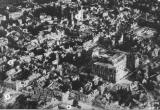industrial town - more
"St. Quentin -- a 19th century industrial town
"St. Quentin which was built on both banks of the Somme, as the ancient capital of Vermandois, was known for the manufacture and trade of cloth and various other fabrics since Medieval Times. On the eve of the Revolution in 1789, the linen weaving industry had expanded considerably. At that time there were estimated to be twelve thousand looms with sixty thousand weavers in the town and its surroundings. The Revolution stopped this expansion, but it started up again slowly at the beginning of the 19th century. The years around 1830 were considered the start of industrial expansion in France and at this time heavy industry was added to the textile work in St. Quentin. The different types of factories attracted people from the surrounding countryside and considerably enlarged the population....
The laborer worked each day for anywhere between ten and twelve hours; he was paid a daily rate as if he were common merchandise. So if you remember that on top of this was the time taken to walk to work, then you realize how completely family life was disrupted and leisure time almost nonexistent. This is typical of this kind of industry which was going to spread and lead to work being completely divorced from family life. These living and working conditions bred people who were very insecure, exposed to many illnesses, confused and lacking in morals. St. Quentin was a good example of the of 19th century industrial town whose people suffered the full force of an emerging industrial revolution whose main, if not to say only, aim was economic profit and financial gain.
It is really astonishing that the young curate who arrived from Rome with the intellectual baggage that we know about, would take straight away to this town where everything was so unfamiliar to him. This was an unusual encounter, even it could even be said extraordinary. Leo Dehon was by his birth, his culture and his tastes destined for a totally different way of life. And yet his most important work would emerge from this encounter. The foundation of his Congregation in the future was indissolubly linked with St. Quentin which was partly responsible for its official name: 'Priests of the Sacred Heart of St. Quentin'." (Yves Ledure, A Short Life of Leo Dehon, Malpas 1998, p. 53s.)
